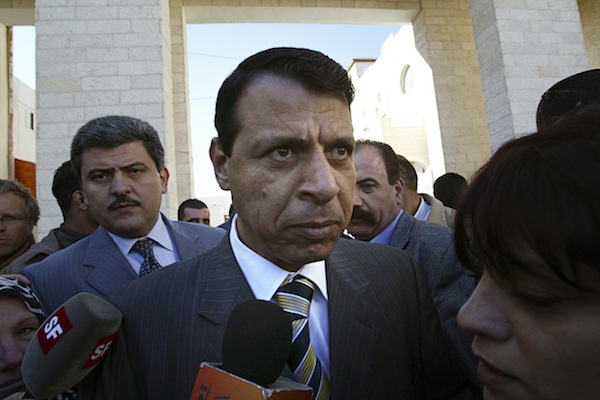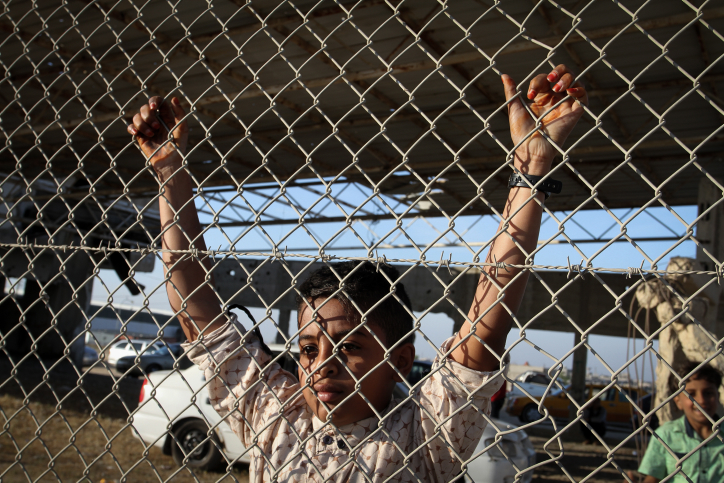A new leaked document reveals a new plan to solve the crisis in Gaza: appointing Mohammad Dahlan, once responsible for crushing Hamas and now Mahmoud Abbas’ greatest threat, to run the besieged Strip.
By Elhanan Miller

In the beginning of June, former Fatah leader Mohammed Dahlan met with representatives of the Egyptian government and leaders of Hamas in Cairo. The details of the mysterious meeting became clear this week, after a leaked document revealed understandings reached by both sides. According to the document, Dahlan — Palestinian President Mahmoud Abbas’ arch nemesis — would be appointed to the prime minister of Gaza.
Neither Dahlan, Hamas, nor Egypt have yet to release an official response to the document, which was first published Ma’an News Agency earlier this week. Even the Palestinian Authority, which will be most harmed by the secret agreement, maintained its right to remain silent. Only Sufian Abu Zaida, a member of Fatah and an ally of Dahlan, bothered to deny the veracity of the document, claiming it was a “media fabrication that has nothing to do with any real result of the dialogue with Hamas.”
Since being expelled from Fatah in June 2011, Dahlan has been living in Abu Dhabi, where he has been channeling funds to Palestinian refugee camps in Gaza and the West Bank, essentially buying support there. Initial indications that Dahlan was playing peacemaker between the Sisi regime in Egypt and Hamas arose in October of last year, when he hinted to an Egyptian television station that reconciliation between Fatah and Hamas would solve Gaza’s problems. It is amazing to witness how Yasser Arafat’s right-hand man when it came to crushing Hamas members in Gaza would become the movement’s biggest advocate, much to Abbas’ discontent.
Should the document be verified, it will be seen as the first breakthrough in the political stalemate in Gaza since Hamas ousted Fatah in a coup there a decade ago. It will also indicate that the Sisi government has lost all faith in Abbas’ ability to return and rule Gaza, and in fact has decided to crown Dahlan as leader of the Strip as a condition for re-opening the Rafah Crossing, all while ensuring Hamas’ continued rule. The document also indicates Hamas’ overall political weakness — and its pragmatism in moments of crisis — which gives up on a great deal of power while siding with former bitter enemy.

The document, made up of 14 clauses, opens with a quick compensation plan for those who were killed in Hamas’ 2007 Gaza coup. The ransom to the families of the dead is supposed to be paid within a month of signing the agreement, and the main fundraiser is none other than Dahlan himself. A Fatah-Hamas unity government will be established on the basis of a “nation plan without political aspects” (a deliberate attempt to eschew talking about Israel and the struggle against it), and will be headed by Dahlan. Hamas will continue to be charged with issues of security “in order to ensure the stability of the security situation in the Strip.”
The partnership is not meant to replace the Palestinian Authority, but rather to work toward rehabilitating Gaza, while aiming to reconnect the West Bank and Gaza. It is meant to realize the “internal Fatah reconciliation,” or in other words: bringing back Dahlan and his supporters to the movement from which they were previously kicked out.
The agreement offers a significant carrot to Hamas: incorporating thousands of public workers appointed by the movement since 2007 into the Palestinian Authority’s bureaucracy, while also allowing Fatah-affiliated clerks the chance to return to their jobs, which they quit en masse on orders from Ramallah during the coup. Here, too, funding is meant to come from Dahlan. The Al-Nahyan family, which rules Abu Dhabi, is likely getting its checkbooks ready.
According to the agreement, border crossings with Israel will be run by security forces appointed by Dahlan, despite the fact that Hamas’ Interior Ministry will be charged with overseeing them. This is a cumbersome model that may have been coordinated with Israel (or was at least intended to placate it), and will allow it to more freely open the crossings at Erez and Kerem Shalom, while excusing the move as part of a coordinated effort with Dahlan. Egypt is meant to permanently keep Rafah Crossing open, while allowing goods to enter the Strip.
In order to prevent a repetition of 2007, Dahlan will be allowed to appoint a personal security team “while receiving guarantees from Hamas.” In exchange, the two sides won’t discuss the legitimacy of Hamas’ arsenal. Egypt will act as the guarantor of the agreement.
As previously mentioned, Dahlan has not responded to the leak. On his official Facebook page, he published a photo of a premature baby in Gaza, and blamed “the Ramallah government” for making the immoral decision to stop funding medical treatments of Gaza patients in Israel and the West Bank.
“What the government and its supporters have done is a crime against humanity. Anyone who takes part in these wretched decisions, which have led to the death of our innocent children, must be punished,” Dahlan wrote.
Elhanan Miller is a research fellow at the Forum for Regional Thinking, where this article was first published in Hebrew.
